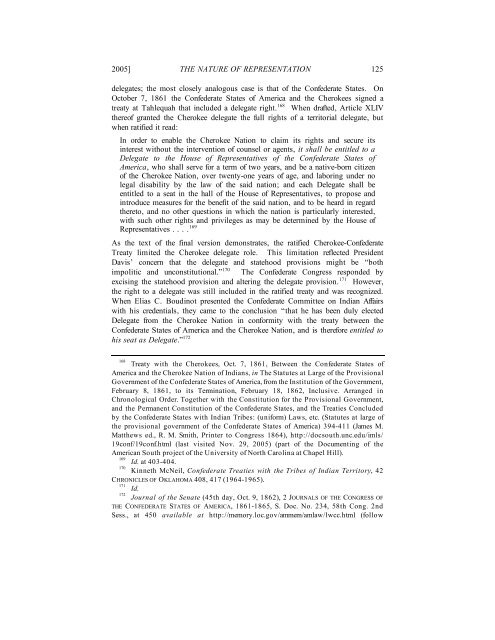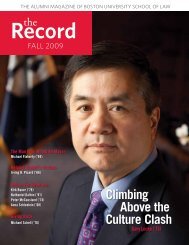the nature of representation: the cherokee right ... - Boston University
the nature of representation: the cherokee right ... - Boston University
the nature of representation: the cherokee right ... - Boston University
You also want an ePaper? Increase the reach of your titles
YUMPU automatically turns print PDFs into web optimized ePapers that Google loves.
2005] THE NATURE OF REPRESENTATION 125<br />
delegates; <strong>the</strong> most closely analogous case is that <strong>of</strong> <strong>the</strong> Confederate States. On<br />
October 7, 1861 <strong>the</strong> Confederate States <strong>of</strong> America and <strong>the</strong> Cherokees signed a<br />
treaty at Tahlequah that included a delegate <strong>right</strong>. 168 When drafted, Article XLIV<br />
<strong>the</strong>re<strong>of</strong> granted <strong>the</strong> Cherokee delegate <strong>the</strong> full <strong>right</strong>s <strong>of</strong> a territorial delegate, but<br />
when ratified it read:<br />
In order to enable <strong>the</strong> Cherokee Nation to claim its <strong>right</strong>s and secure its<br />
interest without <strong>the</strong> intervention <strong>of</strong> counsel or agents, it shall be entitled to a<br />
Delegate to <strong>the</strong> House <strong>of</strong> Representatives <strong>of</strong> <strong>the</strong> Confederate States <strong>of</strong><br />
America, who shall serve for a term <strong>of</strong> two years, and be a native-born citizen<br />
<strong>of</strong> <strong>the</strong> Cherokee Nation, over twenty-one years <strong>of</strong> age, and laboring under no<br />
legal disability by <strong>the</strong> law <strong>of</strong> <strong>the</strong> said nation; and each Delegate shall be<br />
entitled to a seat in <strong>the</strong> hall <strong>of</strong> <strong>the</strong> House <strong>of</strong> Representatives, to propose and<br />
introduce measures for <strong>the</strong> benefit <strong>of</strong> <strong>the</strong> said nation, and to be heard in regard<br />
<strong>the</strong>reto, and no o<strong>the</strong>r questions in which <strong>the</strong> nation is particularly interested,<br />
with such o<strong>the</strong>r <strong>right</strong>s and privileges as may be determined by <strong>the</strong> House <strong>of</strong><br />
Representatives . . . . 169<br />
As <strong>the</strong> text <strong>of</strong> <strong>the</strong> final version demonstrates, <strong>the</strong> ratified Cherokee-Confederate<br />
Treaty limited <strong>the</strong> Cherokee delegate role. This limitation reflected President<br />
Davis’ concern that <strong>the</strong> delegate and statehood provisions might be “both<br />
impolitic and unconstitutional.” 170<br />
The Confederate Congress responded by<br />
excising <strong>the</strong> statehood provision and altering <strong>the</strong> delegate provision. 171 However,<br />
<strong>the</strong> <strong>right</strong> to a delegate was still included in <strong>the</strong> ratified treaty and was recognized.<br />
When Elias C. Boudinot presented <strong>the</strong> Confederate Committee on Indian Affairs<br />
with his credentials, <strong>the</strong>y came to <strong>the</strong> conclusion “that he has been duly elected<br />
Delegate from <strong>the</strong> Cherokee Nation in conformity with <strong>the</strong> treaty between <strong>the</strong><br />
Confederate States <strong>of</strong> America and <strong>the</strong> Cherokee Nation, and is <strong>the</strong>refore entitled to<br />
hisseatasDelegate.” 172<br />
168<br />
Treaty with <strong>the</strong> Cherokees, Oct. 7, 1861, Between <strong>the</strong> Confederate States <strong>of</strong><br />
America and <strong>the</strong> Cherokee Nation <strong>of</strong> Indians, in The Statutes at Large <strong>of</strong> <strong>the</strong> Provisional<br />
Government <strong>of</strong> <strong>the</strong> Confederate States <strong>of</strong> America, from <strong>the</strong> Institution <strong>of</strong> <strong>the</strong> Government,<br />
February 8, 1861, to its Termination, February 18, 1862, Inclusive. Arranged in<br />
Chronological Order. Toge<strong>the</strong>r with <strong>the</strong> Constitution for <strong>the</strong> Provisional Government,<br />
and <strong>the</strong> PermanentConstitution <strong>of</strong> <strong>the</strong> ConfederateStates, and <strong>the</strong> TreatiesConcluded by <strong>the</strong> ConfederateStates with Indian Tribes: (uniform) Laws, etc. (Statutes at large <strong>of</strong><br />
<strong>the</strong> provisional government <strong>of</strong> <strong>the</strong> ConfederateStates <strong>of</strong> America) 394-411 (James M.<br />
Mat<strong>the</strong>ws ed., R. M. Smith, Printer to Congress 1864), http://docsouth.unc.edu/imls/<br />
19conf/19conf.html (last visited Nov. 29, 2005) (part <strong>of</strong> <strong>the</strong> Documenting <strong>of</strong> <strong>the</strong><br />
AmericanSouth project <strong>of</strong> <strong>the</strong> <strong>University</strong> <strong>of</strong> North Carolina at Chapel Hill).<br />
169<br />
Id. at 403-404.<br />
170<br />
Kinneth McNeil, Confederate Treaties with <strong>the</strong> Tribes <strong>of</strong> Indian Territory, 42<br />
CHRONICLESOF OKLAHOMA 408, 417 (1964-1965).<br />
171<br />
Id.<br />
172<br />
Journal<strong>of</strong><strong>the</strong>Senate(45th day, Oct. 9, 1862), 2 JOURNALS OF THE CONGRESS OF<br />
THE CONFEDERATE STATES OF AMERICA, 1861-1865, S. Doc. No. 234, 58th Cong. 2nd<br />
Sess., at 450 available at http://memory.loc.gov/ammem/amlaw/lwcc.html (follow









